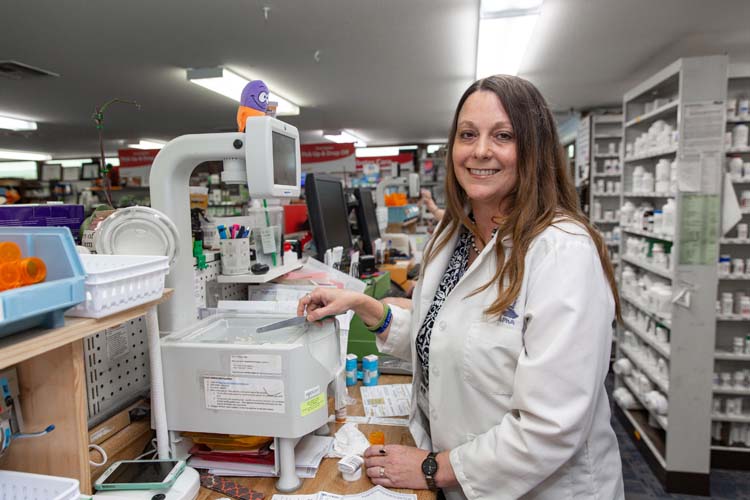
America has a drug problem and it’s not the one you see on the nightly news.
This problem is called “polypharmacy,” and seniors are far more likely to fall victim to it than anyone else.
No one knows that better than Theresa Tolle, president and pharmacist at Sebastian’s Bay Street Pharmacy.
What is polypharmacy?
According to the U.S. National Library of Medicine, polypharmacy is the chronic or continued use of five or more prescription medications. The problem arises because some drugs interfere with the action of other drugs or combine to create unintended and often dangerous effects.
“Certain antibiotics,” Tolle cites as an example, “don’t interact well with certain blood pressure medicines. So, we have to be very, very careful. It’s very common to see a sulfa antibiotic come over or a Cipro antibiotic and [those drugs] can interact badly with drugs the patient is already taking. They can cause heart problems with the medicines that they’re already on … a heart arrhythmia … so we’ll call the doctor and say: ‘Do you want to change this antibiotic to something that doesn’t cause that?’ And that happens a lot. Multiple, multiple times a week.”
Millions of seniors potentially are at risk due to polypharmacy. A Harvard Medical study that was conducted from 1999 through 2012 reported 40 percent of all Americans over the age of 65 were exceeding that five-prescription drug threshold – and that study didn’t even include the skyrocketing number of over-the-counter supplements many seniors now take.
Today the National Institutes of Health says “elderly Americans now consume one-third of all the prescription medications prescribed each year, yet they comprise less than 13 percent of the population.”
On the surface, that might seem understandable. With advancing age, multiple chronic diseases including hypertension or high blood pressure, diabetes, arthritis, chronic heart disease, renal diseases and others become far more commonplace and today’s senior consumers are far more likely to see multiple specialists than any previous generation.
Unfortunately, as NIH points out, “elderly people are at a greater risk for adverse drug reactions [than younger people] because of the metabolic changes and reduced drug clearance associated with aging. This risk is further exacerbated by increasing the number of drugs being used.”
In other words, the more medications anyone takes – and seniors in particular – the greater the chance of adverse effects.
The New York Times confirms the problem, reporting that polypharmacy and inappropriate prescriptions are now at “disturbingly high levels among older adults.”
Another highly authoritative source, the Journal of the American Medical Association, concurs: “We’re not paying enough attention to the interactions and safety of multiple medications” in today’s seniors.
Tolle nods in agreement and says “all day, every day, we are making phone calls to question a prescription that was sent over.” Unfortunately, many accomplished and skilled medical specialists appear willing to leave it to pharmacists like Tolle to sort out the conflicting medications and dangerous interactions that come with widespread polypharmacy. And those pharmacists often face hidden roadblocks.
For example, mail order prescriptions, drugs purchased from Canada, “free” medications offered at places like Publix, says Tolle, often don’t show up on pharmacy computers because they don’t go through insurance company databases. Using multiple different pharmacies for multiple different drugs can further compound the problem.
Further, says Tolle, while the use of over-the-counter supplements like fish oil or vitamin E may benefit a patient, it is vital that those supplements be included on a comprehensive list of medications that seniors should insist all their doctors review. Frequently.
As Tolle puts it, “If you think [a supplement] is strong enough to help you, then it’s also strong enough to hurt you.”
“One thing,” Tolle says, “I pride myself on that we do at Bay Street Pharmacy – that a lot of pharmacies don’t do – is we go out and talk to patients on every new prescription they have filled with us.
“We are looking at their profile while we are talking to them so we can see what [drugs] we know they have. That gives us a chance to ask if there are medicines that aren’t showing up so we can double-check and make sure it’s not a problem.”
No matter which pharmacy you choose to use, that’s sound advice.
It’s entirely possible that you need five or more prescription drugs, but since medications, dosages and conditions can and frequently do change, it’s also essential for seniors to keep a detailed and constantly updated list of the drugs and supplements they’re taking.
After all, it’s not your doctors who are swallowing all those pills. It’s you.
Theresa Tolle is at Bay Street Pharmacy, 7746 Bay Street in Sebastian. The phone number is 772-589-2043.



